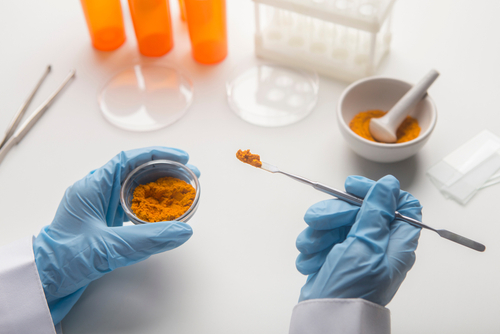让我们保持联系
与我们保持联系,了解医疗保健和肠道健康领域的最新动态!
Turmeric root has been used medicinally for over 2500 years. It has a long history of use in Ayurvedic and Traditional Chinese Medicine to treat a broad spectrum of health conditions characterised by inflammation.6,9
Curcumin is the primary active constituent derived from turmeric. However, it is poorly utilised by the body. Bioavailability-enhanced curcumin supplementation overcomes this obstacle and provides a safe and effective therapy for health conditions characterised by inflammation and pain.9,10,11
Curcumin
Curcuminoids are yellow-coloured polyphenol compounds. They are the primary active constituents of the rhizome of Turmeric (Curcuma longa), a plant belonging to the Ginger (Zingiberaceae) family.7,9
Curcumin (diferuloylmethane) is the principal curcuminoid derived from turmeric and demonstrates the greatest biological activity.7,9
Biological | Health Effects
There are well over 8000 studies on curcumin. On review, they describe a broad spectrum of biological effects:1,7,9,11
Because curcumin has a wide range of biological activities, it has an affinity for a wide range of health conditions. Particularly conditions characterised by disordered/chronic inflammation, including:1,2,4,6,9,13,14
Inflammation and Pain
Researchers have found curcumin effective in treating and preventing conditions characterised by pain and inflammation.6
Inflammation
Inflammation is an adaptive physiological response by the body to harmful stimuli and conditions such as damage to the tissues and infection. 6 Acute inflammation is a short and beneficial response that aims to restore the body to homeostasis.6
If acute inflammation does not resolve and persists for an extended time, it becomes chronic. This long-term inflammation can contribute to a wide range of chronic health conditions, including metabolic, cardiovascular and neurodegenerative diseases, arthritis and some types of cancer.6,14
Curcumin exercises its anti-inflammatory effects by modulating inflammatory signalling pathways and preventing the production of inflammatory mediators.6,14
Supplementation demonstrates significant reductions in inflammatory markers, most notably:3
An increase in the anti-inflammatory cytokine IL-10 is associated with these reductions.3
A note on dosing: long-term dosing of curcumin is most effective. Studies show the greatest effect in treating inflammation, measured by the most significant reduction of CRP levels, is at approximately 13 weeks.3
Pain
Curcumin effectively decreases neuropathic pain and pain-related symptoms through its antioxidant, anti-inflammatory and analgesic properties. It works by:7,11
Spotlight: osteoarthritis (OA)
No longer considered just a “wear and tear” disease OA is more complex, encompassing mechanical, inflammatory and metabolic factors. OA’s pathogenesis appears to be influenced more by inflammation than previously recognised.5
Numerous clinical trials support the use of curcumin in OA. With increased physical function, significant relief from joint inflammation, stiffness, and pain has been measured in various standardised scores.4,5,12,13 Individuals with a higher BMI and advanced age are less likely to respond strongly to curcumin supplementation.13
The anti-inflammatory and cartilaginous protective effects of curcumin are understood to decrease oxidative stress and inflammation, contributing to a slowing of OA’s evolution and clinical progression. In this respect, curcumin supplementation also provides a potential preventative function.4,5
Spotlight: inflammatory bowel disease (IBD)
The aetiology of inflammatory bowel disease is not fully understood; what is understood is that inflammatory mediators such as TNF- ɑ drive disease progression.2
In mild to moderate cases of IBD, especially ulcerative colitis, curcumin improves both symptoms and clinical outcomes, induces remission in mild to moderate cases, and enhances quality of life.4,6
A potential replacement or adjunct to anti-inflammatory medications
Studies in vitro have demonstrated the ability of curcumin to have a similar effect to non-steroidal anti-inflammatory drugs through modulation of the NF kappa-β response.5
Curcumin has been compared to the action of both ibuprofen and diclofenac in human studies, showing equivalence to these drugs without adverse effects such as gastrointestinal symptoms.4
Curcumin can be safely used in conjunction with NSAIDs, decreasing their requirement and alleviating some of their adverse side effects.5,12
Ageing and “inflammaging”
The physiological ageing process is complex and characterised by decreasing cellular function as the regenerative and repair potential of tissues throughout the body diminishes. These changes can lead to many age-related diseases, including arthritis, cardiovascular disease, neurodegenerative diseases, metabolic diseases, chronic obstructive pulmonary disease and cancer.1,14
Both oxidative stress and inflammation are hallmarks of ageing. Their interplay gives rise to the phenomenon called “inflammaging”.1,14
When cells age, their ability to proliferate diminishes, and they are termed “senescent”. This process promotes the secretion of pro-inflammatory mediators, which in turn stokes chronic inflammation, independent from the activation of immune cells.1,14
Chronic inflammation results in raised levels of reactive oxygen species.1,14 Oxidative stress occurs when the body’s ability to detoxify reactive oxygen species (ROS) becomes inadequate. This, in turn, results in an excessive accumulation of ROS that can promote oxidation and cellular damage and further enhance inflammation and cell senescence.1,14
Damage caused by oxidative stress is one of the most important causes of ageing and age-related diseases. Bioenhanced curcumin supplementation is a primary strategy for combating oxidative stress and inflammation.
The importance of choosing the right curcumin supplement
Curcumin has low bioavailability due to four main factors:9,10,11
Clinical trials show that bioavailability enhanced curcumin improves therapeutic efficacy.9,10,11 There are four primary strategies for enhancing the bioavailability of curcumin: 10
Choosing a bioenhanced curcumin supplement will ensure the best possible clinical outcomes.
Improving the quality of life
Curcumin ameliorates and inhibits disease progression in numerous health conditions characterised by pain and inflammation, increasing quality of life.8
Supplementing bioavailability enhanced curcumin in place of standard curcumin significantly improves health-related quality of life.8
REFERENCES

SAMe is a compound best known for its antidepressant action. In this article, we seek to touch on the significant body of evidence that supports

Ingredients (4 serves):• 500g carrots, grated. (Ideally organic)• ½ red onion, finely sliced• Zest & juice of 1 lemon• 2 tsp toasted cumin seeds• 2cm

Turmeric root has been used medicinally for over 2500 years. It has a long history of use in Ayurvedic and Traditional Chinese Medicine to treat a broad spectrum of health conditions characterised by inflammation.6,9
Curcumin is the primary active constituent derived from turmeric. However, it is poorly utilised by the body. Bioavailability-enhanced curcumin supplementation overcomes this obstacle and provides a safe and effective therapy for health conditions characterised by inflammation and pain.9,10,11
Curcumin
Curcuminoids are yellow-coloured polyphenol compounds. They are the primary active constituents of the rhizome of Turmeric (Curcuma longa), a plant belonging to the Ginger (Zingiberaceae) family.7,9
Curcumin (diferuloylmethane) is the principal curcuminoid derived from turmeric and demonstrates the greatest biological activity.7,9
Biological | Health Effects
There are well over 8000 studies on curcumin. On review, they describe a broad spectrum of biological effects:1,7,9,11
Because curcumin has a wide range of biological activities, it has an affinity for a wide range of health conditions. Particularly conditions characterised by disordered/chronic inflammation, including:1,2,4,6,9,13,14
Inflammation and Pain
Researchers have found curcumin effective in treating and preventing conditions characterised by pain and inflammation.6
Inflammation
Inflammation is an adaptive physiological response by the body to harmful stimuli and conditions such as damage to the tissues and infection. 6 Acute inflammation is a short and beneficial response that aims to restore the body to homeostasis.6
If acute inflammation does not resolve and persists for an extended time, it becomes chronic. This long-term inflammation can contribute to a wide range of chronic health conditions, including metabolic, cardiovascular and neurodegenerative diseases, arthritis and some types of cancer.6,14
Curcumin exercises its anti-inflammatory effects by modulating inflammatory signalling pathways and preventing the production of inflammatory mediators.6,14
Supplementation demonstrates significant reductions in inflammatory markers, most notably:3
An increase in the anti-inflammatory cytokine IL-10 is associated with these reductions.3
A note on dosing: long-term dosing of curcumin is most effective. Studies show the greatest effect in treating inflammation, measured by the most significant reduction of CRP levels, is at approximately 13 weeks.3
Pain
Curcumin effectively decreases neuropathic pain and pain-related symptoms through its antioxidant, anti-inflammatory and analgesic properties. It works by:7,11
Spotlight: osteoarthritis (OA)
No longer considered just a “wear and tear” disease OA is more complex, encompassing mechanical, inflammatory and metabolic factors. OA’s pathogenesis appears to be influenced more by inflammation than previously recognised.5
Numerous clinical trials support the use of curcumin in OA. With increased physical function, significant relief from joint inflammation, stiffness, and pain has been measured in various standardised scores.4,5,12,13 Individuals with a higher BMI and advanced age are less likely to respond strongly to curcumin supplementation.13
The anti-inflammatory and cartilaginous protective effects of curcumin are understood to decrease oxidative stress and inflammation, contributing to a slowing of OA’s evolution and clinical progression. In this respect, curcumin supplementation also provides a potential preventative function.4,5
Spotlight: inflammatory bowel disease (IBD)
The aetiology of inflammatory bowel disease is not fully understood; what is understood is that inflammatory mediators such as TNF- ɑ drive disease progression.2
In mild to moderate cases of IBD, especially ulcerative colitis, curcumin improves both symptoms and clinical outcomes, induces remission in mild to moderate cases, and enhances quality of life.4,6
A potential replacement or adjunct to anti-inflammatory medications
Studies in vitro have demonstrated the ability of curcumin to have a similar effect to non-steroidal anti-inflammatory drugs through modulation of the NF kappa-β response.5
Curcumin has been compared to the action of both ibuprofen and diclofenac in human studies, showing equivalence to these drugs without adverse effects such as gastrointestinal symptoms.4
Curcumin can be safely used in conjunction with NSAIDs, decreasing their requirement and alleviating some of their adverse side effects.5,12
Ageing and “inflammaging”
The physiological ageing process is complex and characterised by decreasing cellular function as the regenerative and repair potential of tissues throughout the body diminishes. These changes can lead to many age-related diseases, including arthritis, cardiovascular disease, neurodegenerative diseases, metabolic diseases, chronic obstructive pulmonary disease and cancer.1,14
Both oxidative stress and inflammation are hallmarks of ageing. Their interplay gives rise to the phenomenon called “inflammaging”.1,14
When cells age, their ability to proliferate diminishes, and they are termed “senescent”. This process promotes the secretion of pro-inflammatory mediators, which in turn stokes chronic inflammation, independent from the activation of immune cells.1,14
Chronic inflammation results in raised levels of reactive oxygen species.1,14 Oxidative stress occurs when the body’s ability to detoxify reactive oxygen species (ROS) becomes inadequate. This, in turn, results in an excessive accumulation of ROS that can promote oxidation and cellular damage and further enhance inflammation and cell senescence.1,14
Damage caused by oxidative stress is one of the most important causes of ageing and age-related diseases. Bioenhanced curcumin supplementation is a primary strategy for combating oxidative stress and inflammation.
The importance of choosing the right curcumin supplement
Curcumin has low bioavailability due to four main factors:9,10,11
Clinical trials show that bioavailability enhanced curcumin improves therapeutic efficacy.9,10,11 There are four primary strategies for enhancing the bioavailability of curcumin: 10
Choosing a bioenhanced curcumin supplement will ensure the best possible clinical outcomes.
Improving the quality of life
Curcumin ameliorates and inhibits disease progression in numerous health conditions characterised by pain and inflammation, increasing quality of life.8
Supplementing bioavailability enhanced curcumin in place of standard curcumin significantly improves health-related quality of life.8
REFERENCES

2018年4月26日,Nutrition Care墨尔本在举办。营养品牌创意40周年庆典是澳大利亚著名的保健品生产商,其创立于1978年,40年来一直在寻找新的诞生。而这个40 26日下午1点半,营养关怀40周年庆典在墨尔本皇冠正式拉开序幕。(著名主持人嘉嘉,品牌标志Ian Brighthope,澳洲名牌Lauren Vickers)商业庆典上,Nutrition

5月13日,营养关怀首次冠名全澳华语辩论赛——NC纽新宝杯决赛于市政厅成功举行!本次辩论赛由澳洲著名保健品品牌NC纽新宝独家冠名,活动到场嘉宾有中国组驻墨尔本领事馆杨智勇领事馆,本次评委提出了相当多的专业,就包括《奇葩说》著名辩手陈铭与胡渐彪。辩论社,双方就【消费主义是当代灵魂的良药还是毒药】这个辩题,站在不同的角度,深度探查。最终,纳什大学代表队的表现获得了评委们的一致青睐,夺得本色本届全澳辩论赛中。 比赛结束后,胡渐评委深入浅出冠军药解读【良药】【毒药】的定义,给辩手和台下观众带来更深层次的思考。徐卓阳评委以赞助商NC纽新新宝在台上的养胃粉示范,有趣的饮食习惯对故事进行了深入,通俗易懂,却又发人深思。视频给学生运动员们。视频中伊安感谢学生们的,在母亲节这样特殊的日子里,他想起远离家人的留学生们,要注意自己的身体健康,因为健康对他们说,是在追寻人生梦想最重要的一件急事。最后,纽新宝为嘉宾、评委们以及每一位参加活动的观众准备了养胃小礼物,让大家在观看辩论赛时感受暖心暖暖胃。
与我们保持联系,了解医疗保健和肠道健康领域的最新动态!
| 曲奇饼 | 期间 | 描述 |
|---|---|---|
| cookielawinfo-checkbox-analytics | 11个月 | 此 cookie 由 GDPR cookie 同意插件设置。 cookie 用于在“分析”类别中存储用户对 cookie 的同意。 |
| cookielawinfo-复选框功能 | 11个月 | cookie 由 GDPR cookie 同意设置,用于在“功能”类别中记录用户对 cookie 的同意。 |
| cookielawinfo-checkbox-necessary | 11个月 | 此 cookie 由 GDPR cookie 同意插件设置。 cookie 用于在“必要”类别中存储用户对 cookie 的同意。 |
| cookielawinfo-checkbox-others | 11个月 | 此 cookie 由 GDPR cookie 同意插件设置。 cookie 用于在“其他”类别中存储用户对 cookie 的同意。 |
| cookielawinfo-checkbox-performance | 11个月 | 此 cookie 由 GDPR cookie 同意插件设置。 cookie 用于在“性能”类别中存储用户对 cookie 的同意。 |
| views_cookie_policy | 11个月 | cookie 由 GDPR cookie Consent 插件设置,用于存储用户是否同意使用 cookie。它不存储任何个人数据。 |

Get free shipping on your first order* when you enter your details below.
*A minimum purchase of $25 is required. Always read the labeland follow the directions for use.